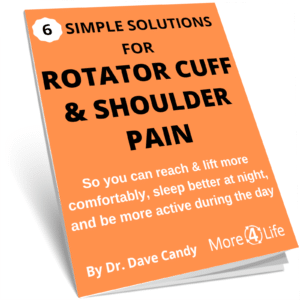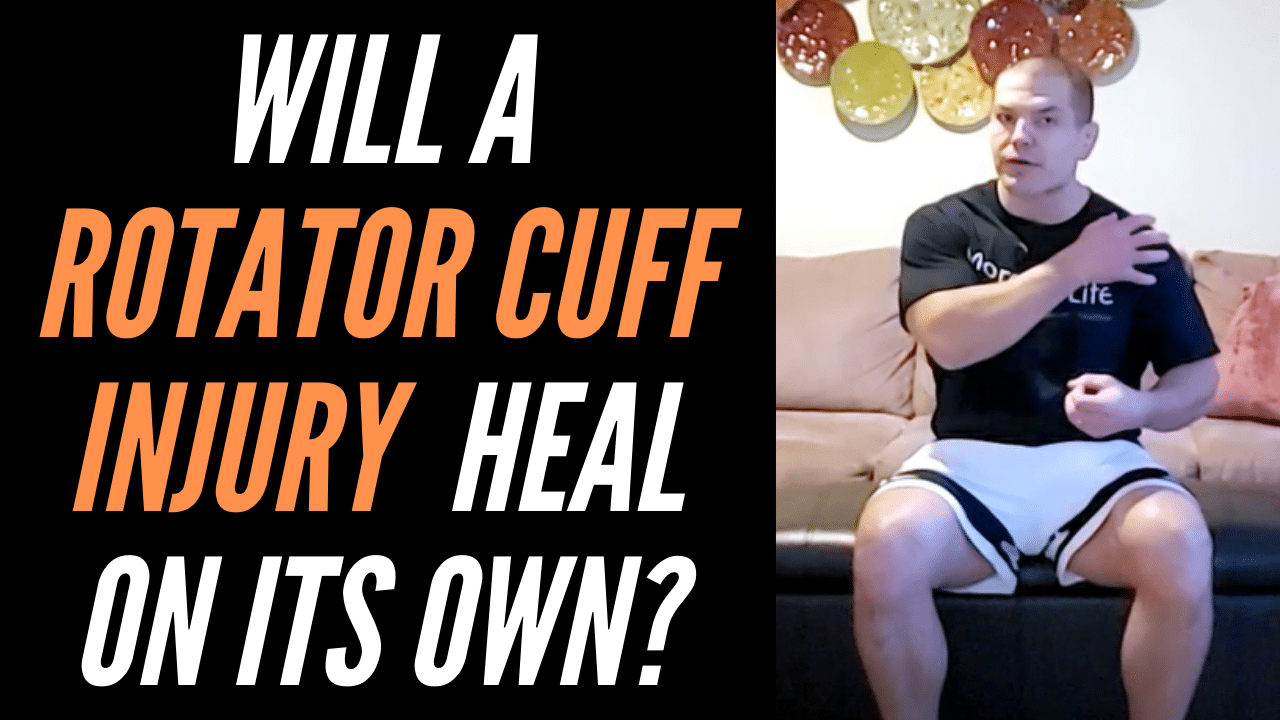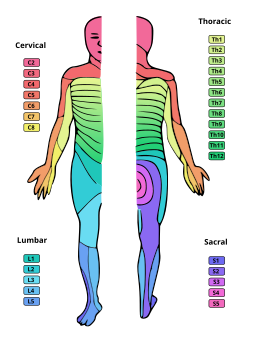Worried That You May Need Surgery For Your Rotator Cuff Injury? Wonder If Your Rotator Cuff Will Heal On Its Own?
Watch the video to learn how to tell if you have a rotator cuff injury, if your rotator cuff can heal on it's own or if you will need surgery, and how you can relieve shoulder pain without surgery

In this post:
- Is your shoulder pain caused by a rotator cuff injury?
- Rotator cuff injury symptoms
- Will my rotator cuff heal on its own?
- What if my MRI shows a rotator cuff tear?
- Will I need rotator cuff surgery?
- Success rates for rotator cuff surgery vs. non-operative treatment
- How to relieve pain from a rotator cuff injury without surgery
Is Your Shoulder Pain Is Caused By A Rotator Cuff Injury?
Rotator cuff injuries are the most common type of shoulder pain. However rotator cuff injuries can range in severity from just some mild inflammation, to tendonitis to partial or complete tears of the rotator cuff.
Rotator Cuff Injury Stages
- Stage 1: Rotator cuff impingement - the rotator cuff muscles get pinched and inflamed in certain positions such as reaching overhead. Common in patients less than 25 years of age.
- Stage 2: Rotator cuff tendinopathy - structural changes start occurring in the tendon. Usually age 25 to 40.
- Stage 3: Rotator cuff tears - may be partial or full. Most common in patients over 40 years old.
These different stages of rotator cuff injury can range in severity from just having occasional aches when you reach for things overhead or lift something heavy to pain that hurts through a good majority of the day and wakes you up at night.
Not All Shoulder Pain Is Caused By Rotator Cuff Injury
However, although some degree of rotator cuff injury is the most common cause of shoulder pain, not all types of shoulder pain are caused from rotator cuff injuries.
If you've lost a substantial amount of motion in your shoulder, particularly if it came on without an injury, you might have a frozen shoulder. Frozen shoulders most commonly occurs in women in their 40's to 60's, particularly if they have diabetes or thyroid problems. Click here to learn more about frozen shoulder.
Your Shoulder Pain Might Be Coming From Your Neck
It's also important to rule out a cervical radiculopathy as the cause of your shoulder pain. Cervical radiculopathy means pain that is referred from your neck and goes into your shoulder and/or arm. The C4 and C5 nerve root in particular refers pain in to the shoulder and the upper arm. The symptoms of a C4 or C5 radiculopathy are very similar to the symptoms of a rotator cuff injury.
So, before you consider having a rotator cuff surgery, you DEFINITELY want to make sure that your shoulder pain is, in fact, caused by a rotator cuff tear and isn't coming from your neck.
The last thing you want is to wake up from a rotator cuff surgery, go through the 6-month recovery process and physical therapy only to discover that you still have the pain because the pain was coming from somewhere else to begin with!
Want To Discover The Cause Of Your Shoulder Pain?
Click the button below to request a Free Shoulder Pain Discovery Visit
Rotator Cuff Injury Symptoms
Early-stage rotator cuff injury symptoms may only occur when you're lifting heavy weights, raising your arms overhead, or reaching behind your back.
As rotator cuff disease progresses though, you may start to lose range of motion in your shoulder or have pain or difficulty with daily activities such as dressing, putting on a coat, fastening a bra, or combing your hair. You may also notice pain at night or shoulder pain after sleeping on your painful shoulder.
Partial rotator cuff tears may start to ache more continuously, particularly in the evening or at night after your arm has been hanging by your side all day.
Contrarily, full rotator cuff tears usually don't hurt. That may sound funny, but after the rotator cuff muscle has torn completely, it no longer hurts when you contract the muscle because the 2 ends of the muscle are no longer connected. However, if you have a full rotator cuff tear, you will probably notice limited shoulder range of motion and some weakness in your arm.
Will My Rotator Cuff Heal On Its Own Or Will I Need Surgery?
If you have a rotator cuff injury, that does NOT necessarily mean that you'll need surgery.
Rotator cuff tears are VERY common in people both with and without pain, particularly after 40 years of age.
About 20% of the general population has a full-thickness rotator cuff tear. However, this number highly correlates with age. Only about 4% of people less than 40 years old have a rotator cuff tear, but as many as 80% of people over the age of 70 have either a partial- or full-thickness rotator cuff tear. (Matthewson et al 2015)
Furthermore, 65% of people with full-thickness rotator cuff tears don't have pain! (Minagawa et al, 2013)
What this means is that rotator cuff tears are more of a normal feature of aging rather than an injury that requires surgery!
What If My MRI Shows A Rotator Cuff Tear?
If your MRI shows a rotator cuff tear AND you have shoulder pain, it is possible that your rotator cuff tear is the cause of your shoulder pain.
However, as noted above, rotator cuff tears are quite common in people over the age of 50. So it's also quite possible that you have an asymptomatic rotator cuff tear and also happen to have shoulder pain caused by something else.
Since rotator cuff tears are rather rare in people less than 40 years old, if you're less than 40, it's more likely that your rotator cuff tear is the cause of your shoulder pain. This is particularly true if you've have a traumatic shoulder injury.
Will I Need Surgery For My Rotator Cuff Injury?
Who actually needs surgery for a rotator cuff injury and who doesn't?
The indications for a rotator cuff surgery include:
- younger than 60 years with a full-thickness rotator tear
- a failed bout of physical therapy lasting at least 3 months
- having symptoms for more than 1 year
- significant shoulder weakness and/or disability.
So if you don’t meet all or most of the criteria above, your chances of needing rotator cuff surgery is low.
What Are The Success Rates For Rotator Cuff Surgery vs. Non-Operative Treatment For Rotator Cuff Injuries
Non-Operative Treatment For Rotator Cuff Injuries
Most rotator cuff injuries can be successfully treated with non-operative treatment. Research studies say 50-90% depending on the size of the tear and the type of treatment studied.
In my opinion, 50% seems rather low compared to the success rates that we observe with our physical therapy for rotator cuff pain, but then again, people often come to us after they've already failed some other type of treatment for their rotator cuff pain.
However, in the worst case scenario, it's still at least as likely that you'll get relief from non-operative treatment for a rotator cuff injury, so it's definitely worth trying before you have surgery.
Rotator Cuff Surgery Success Rate
Success rates with rotator cuff surgery vary depending on the size of the tear:
- Small tears (<1 cm): 94% success rate
- Medium tears (1-3 cm): 85% success rate
- Large tears (3-5 cm): 57% success rate
- Massive Tears (>5 cm): 27% success rate
As you can see, rotator cuff surgery success rates are about the same as the success rates for non-operative treatment.
So why would you want rotator cuff surgery if you don't need to have it?
If the answer is to take care of the problem quicker, think again.
Rotator Cuff Surgery Isn't A Quick Fix
Having rotator cuff surgery isn't like driving your car into the mechanic. You don't drive in with a rotator cuff injury and drive out with a fully functioning shoulder.
You simply trade on injury for another. You fix the rotator cuff injury, but it takes time to allow the surgical trauma to heal.
Rotator Cuff Surgery Recovery Timeline
For most people, it takes 4-6 months to fully recover from a rotator cuff surgery depending on the size of the tear and the level of activity you want to get back to.
If you're a high-performing athlete that plays baseball, volleyball, tennis, or some other throwing or overhead sport, full recovery from rotator cuff surgery may take even longer.
Rotator Cuff Surgery Sling Use
For about the first 6 weeks after rotator cuff surgery, you can expect your arm to be in a abduction sling such as the DonJoy UltraSling IV 100% of the time (other than when showering or at physical therapy).
You also can't do ANYTHING with it.
Rephrase: you SHOULDN'T do anything with it.
Just because you CAN doesn't mean you SHOULD
After the initial trauma from surgery has subsided, your shoulder may start to feel pretty good after a few weeks.
But this DOESN'T mean that the rotator cuff has fully healed.
It takes about 12-16 weeks for your rotator cuff tendon to heal fully. This isn't specific to the rotator cuff.
It's just biology.
Tendon tissue heals slowly because it has a poor blood supply, particularly when your arm is at your side with the rotator cuff tendons stretched over the shoulder joint.
That's one reason why rotator cuff surgery slings have a pillow under the arm as shown above. This allows more blood flow to the tendon to improve healing.
But it still takes time for your rotator cuff to heal after surgery.
Even if you think you're a "quick healer", you're probably not. You're still human.
Your pain may go away quickly, but that actually puts you at GREATER RISK for re-tearing your rotator cuff repair.
About 15-20% of people will re-tear their rotator cuff after surgery.
Largely, this is caused by lack of adherence to post-surgical guidelines and progressing activities too quickly.
TL/DR?
Take Home Point: Rotator cuff surgery isn't a quick quick fix. Be prepared for at 4-6 month recovery timeline after rotator cuff surgery, or you'll be at risk for re-injuring your rotator cuff.
How To Relieve Pain From Rotator Cuff Injury Without Surgery
Some simple changes to your everyday habits are one of the best ways to relieve pain from a rotator cuff injury without surgery.
In fact, finding and fixing the root cause of your rotator cuff injury is the ONLY way to get long-term relief from shoulder pain, whether or not you have surgery.
Barring a traumatic injury, most rotator cuff injuries come on slowly over time from little tiny micro-injuries that you do all day, every day over and over.
Here are some tips to relieve shoulder pain without surgery:
- Make sure that pain isn't coming from your neck. Before you start treating your shoulder and rotator cuff, make certain that you're treating the right part of the body.
- Posture makes a big difference. Keep your chest up and shoulders back slightly (not excessively though).
- Arm support helps. Support your arm on an arm rest or pillow when sitting. Support your arm with your opposite hand when standing or put your hands in your pockets or on your waist.
- Thumbs up for success. When reaching upwards, reaching with your thumb up will put your shoulder in a position so that you're not as likely to pinch the rotator cuff tendons.
- Use your shoulder blade. Two-thirds of your shoulder movement comes from the ball and socket joint itself. The other 1/3 of the shoulder movement comes from moving your shoulder blade on your trunk.
- Get help from a physical therapist. If you've tried self-treating your shoulder blade for more than a few weeks, and it hasn't gotten better yet, request an appointment with a physical therapist to get more specific help for your shoulder pain.




